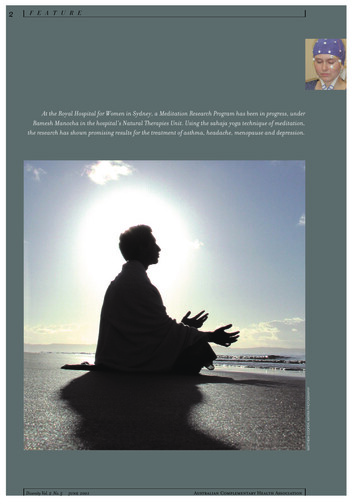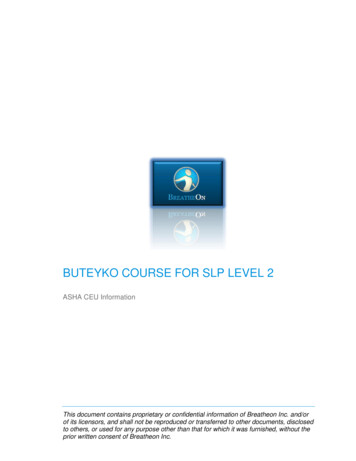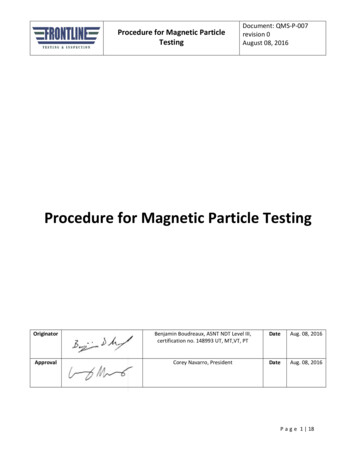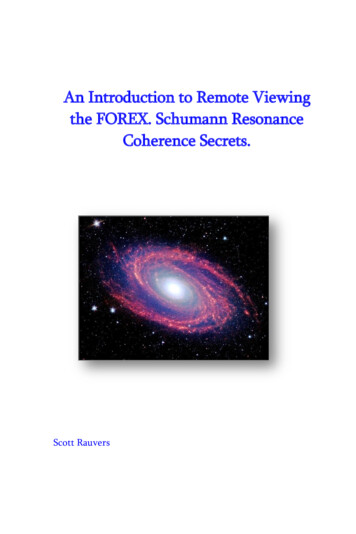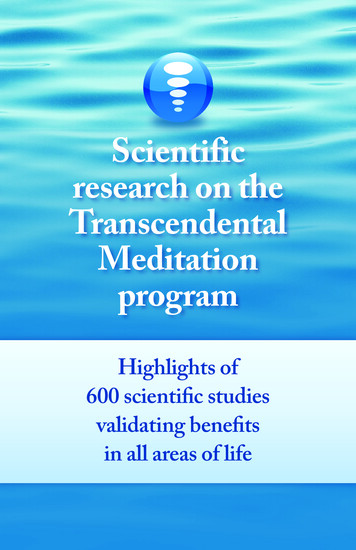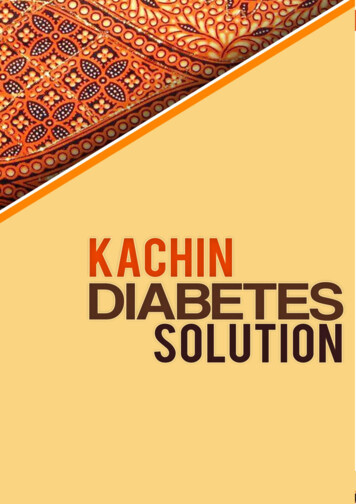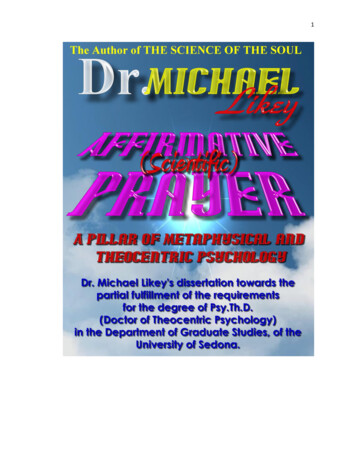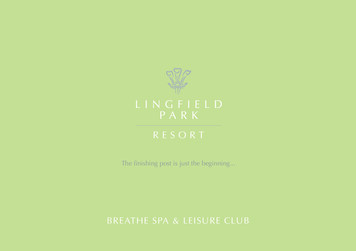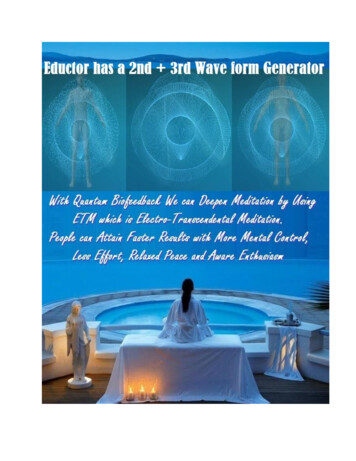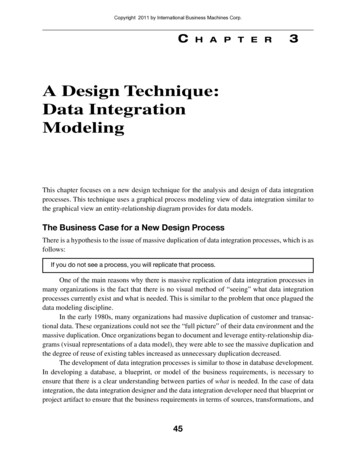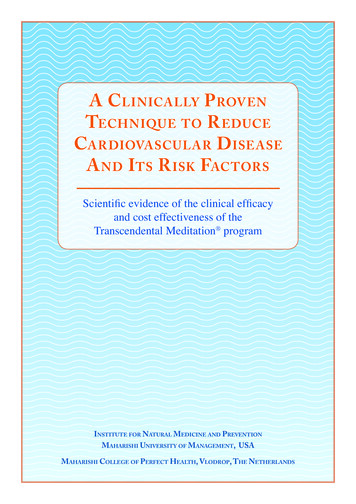
Transcription
A C linically P rov enTechnique to R educeCardiovascular D iseaseA nd Its R isk FactorsScientific evidence of the clinical efficacyand cost effectiveness of theTranscendental Meditation programInstitute for Natural Medicine and PreventionMaharishi University of Management, USAMaharishi College of Perfect Health, Vlodrop, The Netherlands
The Transcendental Meditation technique:A clinically proven natural technique for reducing hypertension and heart diseaseN onpharmacologic T reatmentO f C ardiovascular D iseaseThe Transcendental Meditation technique in the treatmentof hypertension and coronary heart diseaseEXECUTIVE SUMMARYRecent clinical trials, other controlled studies, and meta-analyses (of all relevant studies)have identified a new non-drug treatment that leads to improved medical outcomes forpatients with cardiovascular disease including hypertension and coronary heart disease.This treatment, the Transcendental Meditation program, is widely acceptable, cost effective, and free of harmful side effects. We propose that the Transcendental Meditation program be actively utilized (1.) as a first-line or adjunctive non-drug therapy in high bloodpressure—hypertension (HTN) and (2.) in the adjunctive treatment of coronary heartdisease (CHD).We recommend that insurance companies and other third-party payers provide reimbursement for Transcendental Meditation instruction for:1. treatment of hypertension—either as sole therapy or adjunctive to other conventional therapies2. treatment of coronary heart disease—as part of a multifaceted program including other forms of lifestyle modification and drug therapy as indicated.The scientific rationale for the effectiveness of the Transcendental Meditation programfor these conditions is based on two premises: (i) the well-established principle that stresscauses, contributes to and/or exacerbates cardiovascular diseases such as hypertension andcoronary heart disease, and (ii) a large body of evidence showing that the TranscendentalMeditation technique is the most effective stress-reduction technique available for cardiovascular disease patients. Extensive scientific research has shown reductions in high bloodpressure, hardening of the arteries, enlarged heart size, insulin resistance, anxiety, smoking,alcohol use and mortality.Reducing stress, which means reducing abnormalities in the body that are the result ofoverload, naturally reduces the physiological and pathological consequences of chronicstress.There are yet other reasons for insurance companies to cover this intervention. Severalcost-benefit analyses indicate lower hospitalization rates, lower outpatient utilization ratesand longitudinal reductions in health care costs for those who regularly practice this particular meditation technique.Further, there are simultaneous improvements in health and quality of life in patientsacross a wide range of stress-related disorders. 2009 Maharishi Vedic Education Development Corporation. All rights reserved. Transcendental Meditation, Maharishi University of Management, MaharishiCollege of Perfect Health, and Maharishi Vedic University are registered or common law trademarks, licensed to Maharishi Vedic Education Development Corporation and used under sublicense or with permission.2
The Transcendental Meditation technique:A clinically proven natural technique for reducing hypertension and heart diseaseBackgroundPrevalence and burden of hypertensionand coronary heart diseaseand coronary artery bypass graft surgery.Inadequacies of conventional therapyHealth care costs continue to spiral upward, inlarge part due to the increasing prevalence ofchronic diseases, notably cardiovascular disease.About 30% of the adult population in developednations has hypertension. In the US, about 15 million adults have been diagnosed with CHD, andnearly 50% will die as a result of cardiovasculardisease (CHD or stroke). Thus, cardiovascular disease is the number one cause of premature deathand serious disability in the US and other developed nations, as well as worldwide.Conventional drug therapies do not address thecauses of cardiovascular disease, which are oftenrooted in unhealthy lifestyle behaviors. Furthermore, conventional pharmacological and surgicaltherapies for cardiovascular disease often lead toserious adverse effects, including adverse drug effects, impairments in quality of life, and increasedmortality.For these reasons, national practice guidelines ofthe American Heart Association, the AmericanCollege of Cardiology, the National Institutes ofHealth (NIH) and other professional associationsrecommend non-drug lifestyle modifications (i) asthe first line of therapy for individuals with hypertension and (ii) as part of a comprehensive package of lifestyle modifications and drug therapy forindividuals with diagnoses of CHD.Conventional therapiesMore than 300 billion is spent each year in the USon the diagnosis and treatment of cardiovasculardisease. Conventional therapies encompass a widevariety of drugs including diuretics, beta blockers,ACE inhibitors, angiotensin II receptor blockers,calcium channel blockers, alpha receptor blockers,vasodilators, statins, nitrates, resins, fibrates, niacin,thrombolytics, aspirin and hormone replacementtherapy. Surgical procedures include angioplastyThis latter group includes patients who have had amyocardial infarction, coronary artery proceduresto open clogged arteries (revascularization), chronic angina or stroke.Meta-Analysis II:Decreased Blood PressureMeta-Analysis I:Decreased Blood PressureTHROUGH TRANSCENDENTAL MEDITATIONCOMPARED TO OTHER TECHNIQUESChange inblood pressure (mm Hg)SystolicBlood PressureChange in Systolic Blood PressureTHROUGH TRANSCENDENTAL MEDITATIONDiastolicBlood Pressure0-1.0-2.0-3.0-4.0-5.0-6.0p .05p .0554321TranscendentalMeditation0-1-2-3-4-5p .0002Figure 1: Decreased Blood kCombinedTreatmentNSNSNSNSFigure 2: Decreased Blood PressureCompared to Other TechniquesThis study was a meta-analysis examining the effect ofall published randomized, controlled clinical trials onthe effects of the Transcendental Meditation programon blood pressure, comprising nine studies with 711subjects. The Transcendental Meditation program wasfound to have a statistically significant impact of reducing both systolic and diastolic blood pressure. Reference:American Journal of Hypertension 21: 310–316, 2008.This meta-analysis of 107 published studies on stressreduction and blood pressure found that only the Transcendental Meditation program had a statistically significant impact of reducing high blood pressure amonghypertensive subjects. Reference: Current HypertensionReports 9: 520–528, 2007.3
The Transcendental Meditation technique:A clinically proven natural technique for reducing hypertension and heart diseaseIn contrast, the Transcendental Meditation program,introduced to the world 50 years ago by MaharishiMahesh Yogi, targets a basic, contributing cause ofcardiovascular disease, the lifestyle factor we call‘stress’. Many research studies document the stressreducing and health-promoting effects of the Transcendental Meditation program, and there have beenno documented adverse effects associated with theuse of the program to reduce stress, treat cardiovascular disease, or with its use by the general populationfor disease prevention and health promotion.incorporating objective quality assessments of theresearch literature. They reviewed the published literature through December 2006. The meta-studyevaluated all randomized controlled trials thatcompared BP responses between a group practicing the Transcendental Meditation technique anda control group.Primary outcome measures were changes in systolic and diastolic BP. A specific rating system (0–20points) was used to evaluate the quality of studiesand appropriate statistical procedures (random effects models) were used for the meta-analysis. Themeta-analysis indicated that the TranscendentalMeditation program, compared to control, was associated with the following statistically significantchanges: 4.7 mm Hg in systolic BP and 3.2 mmHg in diastolic BP (FIGURE 1). When the analyseswere limited just to hypertensive groups or just tothe highest-quality studies, similar reductions inBP were found.Data supporting the effectiveness ofthe Transcendental Meditation programin treating cardiovascular diseasea. Hypertension: Randomized clinical trials andother controlled studies show that the Transcendental Meditation program reduces blood pressure in persons with hypertension [1-4]. End organdamage associated with hypertensive heart diseaseis also reduced.The authors concluded that: (a) the Transcendental Meditation program significantly reduces highblood pressure; (b) it reduces SBP by 5 mm Hgand DBP by 3 mm Hg; and, (c) sustained BPreductions of this magnitude are likely to signifi-Dr. J. Anderson and colleagues of the University ofKentucky Medical Center [5] conducted a systematic review and meta-analysis to assess the effectsof the Transcendental Meditation program on BP,Reduction ofHigh Blood PressureReduction HROUGH TRANSCENDENTAL MEDITATIONTranscendentalMeditationChange in carotidintima-media thickness (mm)Change in systolicblood pressure (mm Hg)THROUGH TRANSCENDENTAL n.050-.05HealthEducation-.10-.15p .05p .005Figure 3: Reduction of High Blood PressureFigure 4: Reduction of AtherosclerosisPatients with high blood pressure who learned the Transcendental Meditation program showed a significantreduction of systolic and diastolic blood pressure afterthree months, in contrast to those randomly assigned toa control technique or to those who received educationon how to reduce blood pressure through diet and exercise. Reference: Hypertension 26: 820–827, 1995.Patients with coronary artery disease who learnedthe Transcendental Meditation program showed significantly reduced carotid artery wall thickness after 9months, a surrogate measure of reduced atheroscleroticplaque, compared to health education controls wholearned how to reduce their risk of heart disease throughproper diet and exercise. Reference: Stroke, 2000 Mar.,31(3):568-73.4
The Transcendental Meditation technique:A clinically proven natural technique for reducing hypertension and heart diseasecantly reduce risk for serious cardiovascular disease, that is heart attacks and strokes-5.0 / -2.8 mm Hg (P 0.002/0.02).They concluded that simple biofeedback, relaxation-assisted biofeedback, progressive muscle relaxation and stress management training did notelicit statistically significant reductions in elevatedBP while the Transcendental Meditation technique did.Nearly simultaneously, a systematic review andmeta-analysis of all the published literature onstress reduction and relaxation methods for highblood pressure was conducted by Rainforth et al.[6] (FIGURE 2). These authors critiqued previousmeta-analyses of stress reduction, other relaxationmethods and high blood pressure and concludedthat most were outdated and/or methodologicallylimited.They also concluded that the TranscendentalMeditation program should be recommended topatients with elevated BP for preventing or treating hypertension and other forms of cardiovasculardisease.They, therefore, conducted an updated systematicreview of the published literature and identified107 studies on stress reduction and BP. Seventeentrials (with 23 treatment comparisons and 960participants with elevated BP) met criteria for awell-designed, randomized controlled trial.Available evidence thus indicates that: (i) amongstress reduction approaches, only the Transcendental Meditation program is associated withstatistically significant reductions in BP and (ii)Transcendental Meditation causes reductions inother risk factors for cardiovascular disease andimprovements in clinical cardiovascular diseaserelated outcomes.Meta-analysis was used to calculate BP changes(SBP/DBP) for biofeedback, -0.8/-2.0 mm Hg(P not significant [NS]); relaxation-assisted biofeedback, 4.3/ 2.4 mm Hg (P NS); progressivemuscle relaxation, -1.9/-1.4 mm Hg (P NS);stress management training, -2.3/-1.3 mm (P NS); and the Transcendental Meditation program,b. Coronary Heart Disease: A series of NIHsponsored clinical trials found that high-risk patients who were randomly assigned to the Trancontinued on page 7Regression ofLeft Ventricular MassDecreased Insulin ResistanceIn Metabolic Syndrome109876543210THROUGH TRANSCENDENTAL MEDITATIONHomeostasis model assessmentof insulin resistanceChange in LVMI (g/m2)THROUGH TRANSCENDENTAL MEDITATIONp n0.20-0.2-0.4-0.6-0.8HealthEducationp .01Figure 5: Prevention ofLeft Ventricular HypertrophyFigure 6: Decreased Insulin Resistance ofMetabolic Syndrome in Heart Disease PatientsPatients with hypertensive heart disease who learned theTranscendental Meditation program did not show significantly elevated left ventricular mass after 7 monthscompared to health education controls who learnedhow to reduce their risk of hypertensive heart diseasethrough proper diet and exercise. Reference: Ethnicityand Disease, 2004. 14: S2-54.This randomized controlled clinical trial among individuals with stable cardiac heart disease found that 16 weeksof practice of the Transcendental Meditation program, incontrast to participation in a health education program,led to a significant reduction in insulin resistance, whichis considered the basis of metabolic syndrome that oftenleads to diabetes and heart disease. Reference: Archives ofInternal Medicine 166: 1218–1224, 2006.5
The Transcendental Meditation technique:A clinically proven natural technique for reducing hypertension and heart diseaseTHROUGH TRANSCENDENTAL MEDITATIONTHROUGH TRANSCENDENTAL MEDITATION10090807060TM50403020100Cumulative ProportionSurvivingReduction ofCardiovascular MortalityCumulative ProportionSurvivingReduction ofAll-cause MortalityCombinedcontrolsRR .60; p .03 medium termRR .77; p .04 long sRR .40; p .06 medium termRR .70; p .05 long-term rate02Figure 7: Long-Term Effects of TranscendentalMeditation on All-Cause MortalityTHROUGH TRANSCENDENTAL MEDITATIONAmount of change(standard deviations)Effect size(standard ion-.2-.4-.6-.810DecreasedCigarette SmokingTHROUGH TRANSCENDENTAL MEDITATION-.08This study followed the mortality pattern an average of8 years after elderly individuals with high blood pressure learned the Transcendental Meditation techniqueor participated in control interventions. The resultsshowed a 30% decrease in the rate of cardiovascularmortality among those who learned the TranscendentalMeditation technique. Reference: American Journal ofCardiology 95:1060–1064, 2005Decreased AnxietyOtherTechniques6Figure 8: Reduction of Cardiovascular MortalityElderly patients (average age 72 years) with high bloodpressure who learned the Transcendental Meditationprogram showed significantly lower all-cause mortality rates including cardiovascular over a 10 year period compared to combined controls (health education,mindfulness, generic relaxation and usual care). Reference: American Journal of Cardiology, 2005. 95(9): 10601064.Concentration orContemplation4YEARSYEARSp tation0.0-0.2-0.4-0.6-0.8p .0006-1.0Figure 9: Effectiveness in Reducing Trait AnxietyFigure 10: Decreased Cigarette SmokingA meta-analysis of 146 studies comparing the effectiveness of different mental and physical relaxation techniques including biofeedback on reducing trait anxietyshowed that the Transcendental Meditation techniquewas most effective by a statistically significant margin.Reference: Journal of Clinical Psychology, 1989. 45(6):957–974.A meta-analysis of all research studies on the Transcendental Meditation program related to cigarette smoking, in comparison to meta-analyses of standard treatment and prevention programmes for smoking, founda significantly greater reduction of cigarette use amongthose who learn the Transcendental Meditation program, even though this programme does not involve anyguidance about change in lifestyle or habits. Reference:Alcoholism Treatment Quarterly 11: 13–87, 1994.6
The Transcendental Meditation technique:A clinically proven natural technique for reducing hypertension and heart diseasescendental Meditation program showed reductionsin risk factors for CHD including hypertension[1,2] (FIGURE 3), clogging of the arteries (atherosclerosis) [7,8] (FIGURE 4), the size of the heart’sleft ventricle [9] (FIGURE 5) and resistance to theeffects of insulin [10] (FIGURE 6). Another trialshowed that the Transcendental Meditation program increases exercise tolerance in coronary heartdisease patients [11].tive risk 0.70) in the Transcendental Meditationgroup (compared to combined controls).c. Psychosocial Stress: In a meta-analysis of the effects of stress reduction and relaxation techniqueson anxiety, the most commonly studied form ofpsychosocial stress, Dr. K. Eppley of Stanford University and his colleagues separately estimated andcompared the effects of the main classes of mindbody techniques: stress reduction,relaxation,and theTranscendental Meditation program (FIGURE 9).The long-term effects of the Transcendental Meditation program were also assessed by evaluatingits effects on all-cause mortality and cardiovascular mortality (FIGURES 7-8). This analysis was donefor older subjects who had high blood pressure andwho had participated in randomized controlledtrials that included the Transcendental Meditationprogram and other behavioral interventions [12].The Transcendental Meditation program increasedsurvival (that is, decreased mortality). A statisticalanalysis showed 23% reduction in the mortalityrate from all causes.They reported that the Transcendental Meditation technique reduced anxiety to a significantlygreater extent than other clinically devised formsof relaxation or stylized rest. These differences werefound even after adjustment for experimental design, duration of treatment, expectancy of benefits,and experimenter attitude [14,16].Additional analyses showed that after an averageof 7.6 years, there was a 30% decrease, in the rateof cardiovascular disease-related mortality (rela-This meta-analysis has been critically reviewed[17,18]. Other published meta-analyses have reported that the Transcendental Meditation technique reduced other risk factors for CHD, including sympathetic nervous system arousal [13],smoking [16] (FIGURE 10), and alcohol consumption [16] (FIGURE 11).Decreased Alcohol UseDecreased HospitalizationTHROUGH TRANSCENDENTAL rammesTranscendentalMeditationPer cent decrease of inpatient dayscompared to similar groupsAmount of change(standard deviations)THROUGH TRANSCENDENTAL MEDITATION0.0-0.2-0.4-0.6p .009Figure 11: Decreased Alcohol Use0Ages0–18Ages19–39Ages40 -20%-40%-60%-80%p .0001Figure 12: Decreased HospitalizationIndicating Healthier AgeingA meta-analysis of all research studies on the Transcendental Meditation program related to alcohol use, incomparison to meta-analyses of standard alcohol treatment and prevention programmes, found a significantlygreater reduction of alcohol use among those who learnthe Transcendental Meditation program, even thoughthis programme does not involve any guidance aboutchange in lifestyle or habits. Reference: AlcoholismTreatment Quarterly 11: 13–87, 1994.An analysis of five years of medical insurance datafound that the significant reduction in hospitalizationamong participants in the Transcendental Meditationprogram, in comparison to other insured persons, waseven more dramatic among participants who were older.Reference: Psychosomatic Medicine 49: 493–507, 1987.7
The Transcendental Meditation technique:A clinically proven natural technique for reducing hypertension and heart diseaseWhat is the TranscendentalMeditation program?Decreased Outpatient VisitsThe Transcendental Meditation program has itsorigin in the ancient Vedic tradition [19,20]. Maharishi Mahesh Yogi restored the Vedic knowledgefor the full scientific value of its theory and practice [21]. The Transcendental Meditation techniquedoes not use concentration or contemplation; it isnot a philosophy or religion. It is a simple, naturalyet precise mental technique, practiced twice dailyfor 15 or 20 minutes each session, while sittingcomfortably in a chair with eyes closed. The practice produces a unique state of restful alertness.Per cent decrease in outpatient visitscompared to similar groupsTHROUGH TRANSCENDENTAL MEDITATION0Ages0–18Ages19–39Ages40 -20%-40%-60%-80%p .0001Figure 13: Decreased Outpatient VisitsIndicating Healthier AgeingThe Transcendental Meditation technique hasbeen taught worldwide since 1957. Over 6 millionpeople worldwide have learned the Transcendental Meditation technique, 2 million people in theUnited States. Hundreds of published scientific research studies document its benefits [22].Participants in the Transcendental Meditation program,in contrast to the average of all other insured persons,showed a significant reduction in outpatient doctor visits that was even more pronounced among participantswho were older, as indicated by analysis of five years ofmedical insurance data. Reference: Psychosomatic Medicine 49: 493–507, 1987.How does theTranscendental Meditationtechnique work?Basic and clinical research indicates that practiceof the Transcendental Meditation technique ameliorates hypertension and cardiovascular disease byreducing stress. This in turn reduces the chronicactivation of physiological stress response systems,especially ones that affect the cardiovascular system.DecreasedMedical ExpensesDifference in annual per cent changein expenses for physicians’ servicesTHROUGH TRANSCENDENTAL MEDITATIONAfterTranscendentalMeditation5%0-5%One of these is the sympathetic nervous system(SNS), which causes fight or flight response to theheart and blood vessels. Another is the hypothalamic pituitary-adrenal (HPA) axis [23, 24] whichallows psychosocial stress to drive up blood levelsof stress hormones such as cortisol.BeforeTranscendentalMeditation-10%-15%p .0017Figure 14: Decreased Medical ExpensesAs the chronic effects of stress on mind and bodyare reduced by regular practice of the Transcendental Meditation technique, risk factors for CHD arereduced. As shown above, these include: (1) cardiovascular reactivity [25-27]; (2) anxiety [14]; (3)hypertension [1,2,6,15]; (4) insulin resistance (considered the basis of metabolic syndrome) [10]; (5)smoking [16]; (6) alcohol abuse [16]; and (7) surrogate and intermediate endpoints for CHD such as(a) myocardial ischemia [11], (b) carotid artery wallThis study measured annual percentage change in government payments for physicians’ services over 14 yearsamong 1,418 people in Quebec, Canada, who learnedthe Transcendental Meditation program in comparisonto randomly-selected controls. After learning the Transcendental Meditation program, individuals showed anaverage annual decline of 13.8 per cent in payments.Reference: American Journal of Health Promotion 14:284–291, 2000.8
The Transcendental Meditation technique:A clinically proven natural technique for reducing hypertension and heart diseasethickness [7-8], and (c) left ventricular enlargement(hypertrophy) [7,9,11,29].regular follow-up program is offered to confirmthe correctness of practice.This integrated series of effects leads to a reductionin clinical CHD-related events, including premature mortality [12].Cost/benefitconsiderationsIt is suggested that the Transcendental Meditationprogram reduces cardiovascular disease and its riskfactors because it enables the individual to achievea unique state of restful alertness, which allowsthe body’s endogenous homeostatic and self repairmechanisms to become restored and reactivated.Using the Transcendental Meditation program isdemonstrably cost-effective. The individual fee forthe Transcendental Meditation course in the USAis 2,000 which includes a life time follow-up program.When this happens, blood pressure and other keyfactors revert back to their original, healthier setpoints. In other words, the Transcendental Meditation technique may be thought of as a techniqueto enliven the body’s own inner intelligence [19].These findings are completely in accord with thewidely accepted biobehavioral model of cardiovascular disease [23,24].This is highly cost-effective in light of the documented benefits: Studies [30-34] show that regularpractice of the Transcendental Meditation technique lowers health insurance utilization rates withsignificantly fewer hospital inpatient days and outpatient visits, and fewer inpatient admissions forall major categories of disease (FIGURES 12-14).Across all disease categories, there was a 56% lower utilization rate. For the two key physiologicalsystems relevant to this proposal, reductions wereeven greater: 87% reductions for both cardiovascular disease and for diseases of the nervous system.A Canadian study [32-33] showed a longitudinalreduction (a cumulative savings of 13% per year)in government payments to physicians.Instruction and follow-upThe Transcendental Meditation technique istaught by certified instructors in a standardizedway everywhere in the world, through a systematic program of instruction. The TranscendentalMeditation course gives the individual the experience and knowledge needed to correctly practicethe Transcendental Meditation technique on theirown, and gain the maximum benefits.ConclusionThe course consists of seven meetings with theprofessional instructor, with 90 minutes per meeting. These seven meetings consist of:A cumulative body of well designed clinical trials, other clinical studies, and meta-analyses demonstrates that a nonpharmacologic approach, theTranscendental Meditation program—for thetreatment of hypertension, coronary heart diseaseand their risk factors is effective in the sole or adjunctive care of cardiovascular disease. Furthermore, there are no harmful side effects from thistechnique Additional benefits include improvedquality of life and reduction or elimination of other chronic stress-related conditions.1. Introductory lecture (in a group) describingthe benefits.2. Preparatory lecture (in a group) describinghow the technique works3. A brief personal interview with the instructor.4. Personal instruction in the TranscendentalMeditation technique.5-7. Group meetings based on the individuals’ experiences of practicing Transcendental Meditation.These clinical effects are clearly cost-effective.Based on the published biomedical evidence, it isproposed that payment of the cost of Transcendental Meditation instruction by insurance companiesand third-party payers is justified and timely.Individuals often notice immediate benefits oftheir practice of the Transcendental Meditationtechnique during these first days of instruction. A9
The Transcendental Meditation technique:A clinically proven natural technique for reducing hypertension and heart diseaseMajor Cardiovascular Disease Factors Reduced byOne Natural and Effective Procedure, Free From Side-EffectsReduced SympatheticNervous System Arousal*DecreasedMedical ExpensesFaster Recoveryfrom StressDecreasedAnxiety and ent VisitsReduction ofCardiovascularMortalityImproved FunctionalCapacity in Heart FailureDecreasedBlood PressurePublishedResearch on olRegression ofLeft Ventricular MassImproved Exercise Tolerancein Angina PectorisDecreasedInsulin ResistanceDecreasedCigarette SmokingReduction ofAtherosclerosisDecreasedAlcohol UseImproved Clinical Outcome andReduced Need for Pharmacological and Surgical TreatmentsThousands of physicians worldwide recommend the practice ofthe Transcendental Meditation program to their patients*The indicated sequence is a simplified version of complex and parallel physiological interactions10
The Transcendental Meditation technique:A clinically proven natural technique for reducing hypertension and heart diseaseReferences1. Schneider, R.H., Staggers, F., Alexander, C., Sheppard, W., Rainforth, M., Kondwani, K., Smith, S., andKing, C.G., A randomized controlled trial of stress reduction for hypertension in older African Americans.Hypertension, 1995. 26: p. 820-827.2. Alexander, C.N., Schneider, R., Staggers, F., Sheppard, W., Clayborne, M., Rainforth, M., Salerno, J.,Kondwani, K., Smith, S., Walton, K., and Egan, B., Atrial of stress reduction for hypertension in older African Americans (Part II): Sex and risk factor subgroupanalysis. Hypertension, 1996. 28(1): p. 228-237.3. Walton, K.G., Schneider, R.H., Nidich, S.I., Salerno,J.W., Nordstrom, C.K., and Bairey-Merz, C.N., Psychosocial stress and cardiovascular disease 2: Effectiveness of the Transcendental Meditation technique intreatment and prevention. Behavioral Medicine, 2002.28(3): p. 106-123.4. Walton, K., Schneider, R., and Nidich, S., Reviewof controlled research on the Transcendental Meditation Program and cardiovascular disease - Risk Factors,Morbidity and Mortality. Cardiology in Review, 2004.12(5): p. 262-266.5. Anderson J.W., Liu C., and Kryscio R.J., Blood pressure response to transcendental meditation: A metaanalysis. Am J Hypertens 2008; 21:310-316.6. Rainforth M.V., Schneider R.H., Nidich S.I., Gaylord-King, C., Salerno J.W., and Anderson J.W., StressReduction Programs in Patients with Elevated BloodPressure: A Systematic Review and Meta-analysis.Current Hypertension Reports 2007, 9:520–528.7. Castillo-Richmond, A., Schneider, R., Alexander,C., Cook, R., Myers, H., Nidich, S., and Haney, C.,Rainforth, M., Salerno, J., Effects
A CliniCAlly Proven TeChnique To reduCe CArdiovAsCulAr diseAse And iTs risk FACTors insTiTuTe For nATurAl MediCine And PrevenTion MAhArishi universiTy oF MAnAgeMenT, usA MAhArishi College oF PerFeCT heAlTh, vlodroP, The neTherlAnds Scientific evidence of the clinical efficacy and cost effectiveness o
